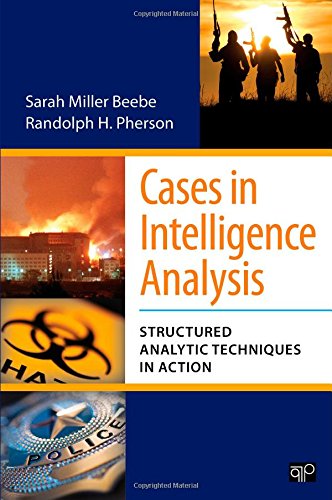![A companion website is available for this text]()
Accomplished instructors and intelligence practitioners Beebe and Pherson have created a set of twelve robust, class-tested cases on events in foreign intelligence, counterintelligence, terrorism, homeland security, law enforcement, and decision-making support. The case studies are designed to give analysts-intraining a hands-on opportunity to apply structured analytic techniques to tackle real-life problems. Each case delivers a compelling narrative and a set of step-by-step instructions that make teaching and learning as effective and efficient as possible.
Key Features:
- Questions at the start of each case challenge the student to think critically and help the students bring the case into focus;
- Carefully crafted narratives provide the right amount of detail to give a realistic sense of the complexity and challenges of the case;
- Recommended readings at the end of each narrative allow room for further research
- Sections entitled "Structured Analytic Techniques in Action" frame the analytic tasks and provide step-by-step instructions for applying three to fi ve analytic techniques in a series of exercises for each case study;
- Two hundred photos, maps, figures, tables, boxes, and technique templates support analysis and instruction; and
- A matrix of the cases and techniques used in each cases augment the annotated table of contents and provide students and instructors an all-in-one view of the contents.
To make the teaching of the cases as turn-key as possible, Beebe and Pherson have created a case-by-case guide, Cases in Intelligence Analysis: Instructor’s Materials, that is free to all users as a downloadable PDF. Instructor’s Materials includes solutions to all of the exercises, teaching tips, conclusions for each of the cases, and key takeaways that can be used to guide classroom discussion.
Techniques covered include:
Analysis of Competing Hypotheses
Deception Detection
The Decision Matrix
Devil’s Advocacy
Force Field Analysis
Indicators
Indicators Validator
Key Assumptions Check
Mind Maps
Multiple Hypothesis Generation
Multiple Scenarios Generation
Outside-In Thinking
The Pre-Mortem Analysis
Pros-Cons-Faults-and-Fixes
Quadrant Crunching
Red Hat Analysis
Simple Scenarios
Starbursting
Strengths-Weaknesses-Opportunities-Threats
Structured Brainstorming
Structured Self-Critique
Timelines and Chronologies
Sarah Miller Beebe began thinking about a book of cases during her career as an analyst and manager at the Central Intelligence Agency. A variety of broadening experiences, including an assignment as director for Russia on the National Security Council staff and a position as a national counterintelligence officer at the Office of the National Counterintelligence Executive, drove home the need for rigorous and effective approaches to intelligence analysis. It became apparent to her that cases could not only teach important analytic lessons surrounding historical events but also give analysts experience using a question-based thinking approach underpinned by practical techniques to improve their analyses. Now, as owner of Ascendant Analytics, she helps organizations apply such techniques against their specific analytic problems.
Randolph H. Pherson is president of Pherson Associates, LLC; CEO of Globalytica, LLC; and a founding director of the nonprofit Forum Foundation for Analytic Excellence. He teaches advanced analytic techniques and critical thinking skills to analysts in the government and private sector. Mr. Pherson collaborated with Richards Heuer Jr. in developing and launching use of Analysis of Competing Hypotheses, and he developed several analytic techniques for the CIA’s Sherman Kent School, many of which were incorporated in his Handbook of Analytic Tools and Techniques. He coauthored Critical Thinking for Strategic Intelligence with Katherine Hibbs Pherson, Cases in Intelligence Analysis: Structured Analytic Techniques in Action with Sarah Miller Beebe, and several other guides for analysts on writing, briefing, indicators, and managing the production process. Mr. Pherson completed a twenty-eight-year career in the Intelligence Community in 2000, last serving as National Intelligence Officer (NIO) for Latin America. Previously at the CIA, Mr. Pherson managed the production of intelligence analysis on topics ranging from global instability to Latin America, served on the Inspector General’s staff, and was chief of the CIA’s Strategic Planning and Management Staff. He is the recipient of the Distinguished Intelligence Medal for his service as NIO and the Distinguished Career Intelligence Medal. Mr. Pherson received his B.A. from Dartmouth College and an M.A. in international relations from Yale University.
![]()
